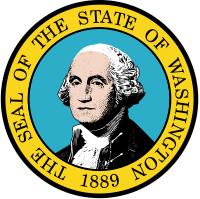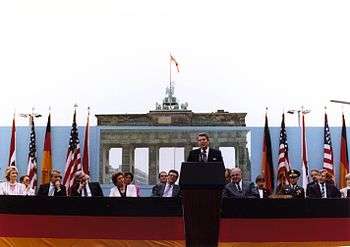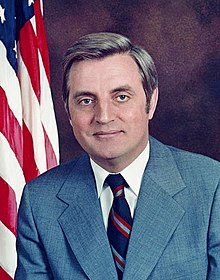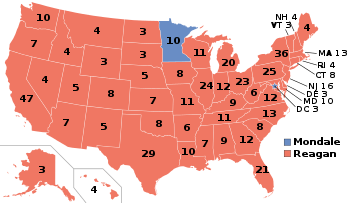1984 United States presidential election in Washington (state)
The 1984 United States presidential election in Washington took place on November 6, 1984. All 50 states and the District of Columbia, were part of the 1984 United States presidential election. Voters chose 10 electors to the Electoral College, which selected the president and vice president of the United States.
| ||||||||||||||||||||||||||
| ||||||||||||||||||||||||||
 County Results
| ||||||||||||||||||||||||||
| ||||||||||||||||||||||||||
| Elections in Washington |
|---|
 |
|
General elections
Gubernatorial elections
Lieutenant Governor elections Attorney General elections Secretary of State elections State Senate elections State House elections State Supreme Court elections Other judicial elections |
|
|
The State of Washington was won by incumbent United States President Ronald Reagan of California, who was running against former Vice President Walter Mondale of Minnesota. Reagan ran for a second time with incumbent Vice President and former C.I.A. Director George H. W. Bush of Texas, and Mondale ran with Representative Geraldine Ferraro of New York, the first major female candidate for the vice presidency. This is the last time Washington has voted for a Republican in a presidential election, though Colin Powell would receive the votes of three faithless electors in 2016.
Partisan background
The presidential election of 1984 was a very partisan election for Washington, with over 98 percent of the electorate voting for either the Democratic or Republican parties.[1] Nearly all counties in Washington voted mainly Republican, save a handful of counties along the southern Pacific coast of the state, which voted mainly Democratic. This included Seattle's highly populated King County, which is the most recent time Seattle has voted Republican. This is also the last time that Pierce County, Thurston County, and San Juan County voted Republican.[2]
Washington weighed in for this election as 3% more Democratic than the national average.
Democratic platform
Walter Mondale accepted the Democratic nomination for presidency after pulling narrowly ahead of Senator Gary Hart of Colorado and Rev. Jesse Jackson of Illinois - his main contenders during what would be a very contentious[3] Democratic primary. During the campaign, Mondale was vocal about reduction of government spending, and, in particular, was vocal against heightened military spending on the nuclear arms race against the Soviet Union,[4] which was reaching its peak on both sides in the early 1980s.
Taking a (what was becoming the traditional liberal) stance on the social issues of the day, Mondale advocated for gun control, the right to choose regarding abortion, and strongly opposed the repeal of laws regarding institutionalized prayer in public schools. He also criticized Reagan for what he charged was his economic marginalization of the poor, stating that Reagan's reelection campaign was "a happy talk campaign," not focused on the real issues at hand.[5]
A very significant political move during this election: the Democratic Party nominated Representative Geraldine Ferraro to run with Mondale as Vice-President. Ferraro is the first female candidate to receive such a nomination in United States history. She said in an interview at the 1984 Democratic National Convention that this action "opened a door which will never be closed again,"[6] speaking to the role of women in politics.
Republican platform

By 1984, Ronald Wilson Reagan was very popular with voters across the nation as the President who saw them out of the economic stagflation of the early and middle 1970's, and into a period of (relative) economic stability.[7]
The economic success seen under Reagan was politically accomplished (principally) in two ways. The first was initiation of deep tax cuts for the wealthy,[8] and the second was a wide-spectrum of tax cuts for crude oil production and refinement, namely, with the 1980 Windfall profits tax cuts.[9] These policies were augmented with a call for heightened military spending,[10] the cutting of social welfare programs for the poor,[11] and the increasing of taxes on those making less than $50,000 per year.[8] Collectively called "Reaganomics", these economic policies were established through several pieces of legislation passed between 1980 and 1987.
Some of these new policies also arguably curbed several existing tax loopholes, preferences, and exceptions, but Reaganomics is typically remembered for its trickle down effect of taxing poor Americans more than rich ones. Reaganomics has (along with legislation passed under presidents George H. W. Bush and Bill Clinton) been criticized by many analysts as "setting the stage" for economic troubles in the United State after 2007, such as the Great Recession.[12]
Virtually unopposed during the Republican primaries, Reagan ran on a campaign of furthering his economic policies. Reagan vowed to continue his "war on drugs," passing sweeping legislation after the 1984 election in support of mandatory minimum sentences for drug possession.[13] Furthermore, taking a (what was becoming the traditional conservative) stance on the social issues of the day, Reagan strongly opposed legislation regarding comprehension of gay marriage, abortion, and (to a lesser extent) environmentalism,[14] regarding the final as simply being bad for business.
Republican victory
Reagan won the election in Washington with a decisive 13 point landslide. The election results in Washington are reflective of a nationwide reconsolidation of base for the Republican Party which took place through the 1980s; called by Reagan the "second American Revolution."[7] This was most evident during the 1984 presidential election. No Republican candidate has received as strong of support in the American Pacific states at large, as Californian Reagan did. This is also the most recent election cycle where Washington sent Republican electors to the Electoral College.
It is speculated that Mondale lost support with voters nearly immediately during the campaign, namely during his acceptance speech at the 1984 Democratic National Convention. There he stated that he intended to increase taxes. To quote Mondale, "By the end of my first term, I will reduce the Reagan budget deficit by two thirds. Let's tell the truth. It must be done, it must be done. Mr. Reagan will raise taxes, and so will I. He won't tell you. I just did."[5] Despite this claimed attempt at establishing truthfulness with the electorate, this claim to raise taxes badly eroded his chances in what had already begun as an uphill battle against the charismatic Ronald Reagan.
Reagan also enjoyed high levels of bipartisan support during the 1984 presidential election in Washington, and across the nation at large. Many registered Democrats who voted for Reagan (Reagan Democrats) stated that they had chosen to do so because they associated him with the economic recovery, because of his strong stance on national security issues with Russia, and because they considered the Democrats as "supporting American poor and minorities at the expense of the middle class."[14] These public opinion factors contributed to Reagan's 1984 landslide victory, in Washington and elsewhere.
Results
| 1984 United States presidential election in Washington | |||||
|---|---|---|---|---|---|
| Party | Candidate | Votes | Percentage | Electoral votes | |
| Republican | Ronald Reagan | 1,051,670 | 55.82% | 10 | |
| Democratic | Walter Mondale | 807,352 | 42.86% | 0 | |
| Libertarian | David Bergland | 8,844 | 0.47% | 0 | |
| America First | Bob Richards | 5,724 | 0.30% | 0 | |
| Independent | Lyndon LaRouche | 4,712 | 0.25% | 0 | |
| Citizen's Party | Sonia Johnson | 1,891 | 0.10% | 0 | |
| New Alliance Party | Dennis Serrette | 1,654 | 0.09% | 0 | |
| Communist Party | Gus Hall | 814 | 0.04% | 0 | |
| Workers World Party | Larry Holmes | 641 | 0.03% | 0 | |
| Socialist Workers Party | Melvin Mason | 608 | 0.03% | 0 | |
| Totals | 1,883,910 | 100.0% | 10 | ||
Results by county
| County | Ronald Wilson Reagan Republican |
Walter Fritz Mondale Democratic |
Various candidates Other parties |
Margin | Total votes cast | ||||
|---|---|---|---|---|---|---|---|---|---|
| # | % | # | % | # | % | # | % | ||
| Adams | 3,449 | 71.72% | 1,311 | 27.26% | 49 | 1.02% | 2,138 | 44.46% | 4,809 |
| Asotin | 3,876 | 55.21% | 3,042 | 43.33% | 103 | 1.47% | 834 | 11.88% | 7,021 |
| Benton | 32,307 | 69.28% | 13,784 | 29.56% | 540 | 1.16% | 18,523 | 39.72% | 46,631 |
| Chelan | 13,667 | 65.10% | 6,978 | 33.24% | 349 | 1.66% | 6,689 | 31.86% | 20,994 |
| Clallam | 13,605 | 57.32% | 9,701 | 40.87% | 429 | 1.81% | 3,904 | 16.45% | 23,735 |
| Clark | 40,681 | 52.86% | 35,248 | 45.80% | 1,028 | 1.34% | 5,433 | 7.06% | 76,957 |
| Columbia | 1,404 | 67.02% | 673 | 32.12% | 18 | 0.86% | 731 | 34.89% | 2,095 |
| Cowlitz | 14,858 | 47.98% | 15,361 | 49.60% | 749 | 2.42% | -503 | -1.62% | 30,968 |
| Douglas | 6,443 | 66.44% | 3,127 | 32.24% | 128 | 1.32% | 3,316 | 34.19% | 9,698 |
| Ferry | 1,232 | 55.75% | 935 | 42.31% | 43 | 1.95% | 297 | 13.44% | 2,210 |
| Franklin | 7,724 | 62.96% | 4,328 | 35.28% | 216 | 1.76% | 3,396 | 27.68% | 12,268 |
| Garfield | 913 | 63.94% | 493 | 34.52% | 22 | 1.54% | 420 | 29.41% | 1,428 |
| Grant | 12,888 | 65.81% | 6,298 | 32.16% | 398 | 2.03% | 6,590 | 33.65% | 19,584 |
| Grays Harbor | 11,286 | 43.96% | 14,050 | 54.73% | 335 | 1.30% | -2,764 | -10.77% | 25,671 |
| Island | 13,548 | 65.72% | 6,850 | 33.23% | 218 | 1.06% | 6,698 | 32.49% | 20,616 |
| Jefferson | 4,543 | 48.67% | 4,602 | 49.30% | 189 | 2.02% | -59 | -0.63% | 9,334 |
| King | 332,987 | 52.09% | 298,620 | 46.71% | 7,654 | 1.20% | 34,367 | 5.38% | 639,261 |
| Kitsap | 36,101 | 54.11% | 29,681 | 44.49% | 931 | 1.40% | 6,420 | 9.62% | 66,713 |
| Kittitas | 6,580 | 57.06% | 4,830 | 41.89% | 121 | 1.05% | 1,750 | 15.18% | 11,531 |
| Klickitat | 3,910 | 57.87% | 2,712 | 40.14% | 135 | 2.00% | 1,198 | 17.73% | 6,757 |
| Lewis | 15,846 | 66.22% | 7,634 | 31.90% | 451 | 1.88% | 8,212 | 34.32% | 23,931 |
| Lincoln | 3,474 | 66.90% | 1,671 | 32.18% | 48 | 0.92% | 1,803 | 34.72% | 5,193 |
| Mason | 8,410 | 53.74% | 7,007 | 44.77% | 233 | 1.49% | 1,403 | 8.96% | 15,650 |
| Okanogan | 7,476 | 57.25% | 5,330 | 40.81% | 253 | 1.94% | 2,146 | 16.43% | 13,059 |
| Pacific | 3,613 | 42.90% | 4,679 | 55.56% | 129 | 1.53% | -1,066 | -12.66% | 8,421 |
| Pend Oreille | 2,374 | 58.26% | 1,655 | 40.61% | 46 | 1.13% | 719 | 17.64% | 4,075 |
| Pierce | 112,877 | 57.85% | 79,498 | 40.75% | 2,733 | 1.40% | 33,379 | 17.11% | 195,108 |
| San Juan | 2,900 | 52.48% | 2,514 | 45.49% | 112 | 2.03% | 386 | 6.99% | 5,526 |
| Skagit | 18,840 | 56.53% | 13,947 | 41.85% | 539 | 1.62% | 4,893 | 14.68% | 33,326 |
| Skamania | 1,736 | 51.99% | 1,552 | 46.48% | 51 | 1.53% | 184 | 5.51% | 3,339 |
| Snohomish | 90,362 | 56.83% | 66,728 | 41.97% | 1,905 | 1.20% | 23,634 | 14.86% | 158,995 |
| Spokane | 88,043 | 58.96% | 59,620 | 39.92% | 1,673 | 1.12% | 28,423 | 19.03% | 149,336 |
| Stevens | 8,211 | 64.29% | 4,304 | 33.70% | 256 | 2.00% | 3,907 | 30.59% | 12,771 |
| Thurston | 34,442 | 55.51% | 26,840 | 43.26% | 763 | 1.23% | 7,602 | 12.25% | 62,045 |
| Wahkiakum | 776 | 44.62% | 930 | 53.48% | 33 | 1.90% | -154 | -8.86% | 1,739 |
| Walla Walla | 12,361 | 63.72% | 6,804 | 35.08% | 233 | 1.20% | 5,557 | 28.65% | 19,398 |
| Whatcom | 27,228 | 53.72% | 22,670 | 44.73% | 788 | 1.55% | 4,558 | 8.99% | 50,686 |
| Whitman | 10,021 | 59.48% | 6,621 | 39.30% | 207 | 1.23% | 3,400 | 20.18% | 16,849 |
| Yakima | 40,678 | 61.46% | 24,724 | 37.36% | 780 | 1.18% | 15,954 | 24.11% | 66,182 |
| Totals | 1,051,670 | 55.82% | 807,352 | 42.86% | 24,888 | 1.32% | 244,318 | 12.97% | 1,883,910 |
References
- "1984 Presidential General Election Results – Washington". Dave Leip's Atlas of U.S. Presidential Elections. Retrieved 2018-01-26.
- Sullivan, Robert David; ‘How the Red and Blue Map Evolved Over the Past Century’; America Magazine in The National Catholic Review; June 29, 2016
- Kurt Andersen, "A Wild Ride to the End", Time, May 28, 1984
- Trying to Win the Peace, by Even Thomas, Time, July 2, 1984
- Mondale's Acceptance Speech, 1984, AllPolitics
- Martin, Douglas (2011-03-27). "Geraldine A. Ferraro, First Woman on Major Party Ticket, Dies at 75". The New York Times. pp. A1. Retrieved November 5, 2013.
- Raines, Howell (November 7, 1984). "Reagan Wins By a Landslide, Sweeping at Least 48 States; G.O.P. Gains Strength in House". The New York Times. Retrieved November 11, 2013.
- "U.S. Federal Individual Income Tax Rates History, 1913–2011 (Nominal and Inflation-Adjusted Brackets)". Tax Foundation. September 9, 2011. Archived from the original on January 16, 2013. Retrieved November 10, 2013.
- Joseph J. Thorndike (Nov 10, 2005). "Historical Perspective: The Windfall Profit Tax". Retrieved November 11, 2013.
- Historical tables, Budget of the United States Government Archived 2012-04-17 at the Wayback Machine, 2013, table 6.1.
- Niskanen, William A. (1992). "Reaganomics". In David R. Henderson (ed.). Concise Encyclopedia of Economics (1st ed.). Library of Economics and Liberty. OCLC 317650570, 50016270, 163149563
- Jerry Lanson (2008-11-06). "A historic victory. A changed nation. Now, can Obama deliver?". Christian Science Monitor. Retrieved 2013-11-02.
- Alexander, Michelle (2010). The New Jim Crow. New York: The New Press. p. 5. ISBN 978-1595581037.
- Prendergast, William B. (1999). The Catholic vote in American politics. Washington DC: Georgetown University Press. pp. 186, 191–193. ISBN 0-87840-724-3.
.jpg)

